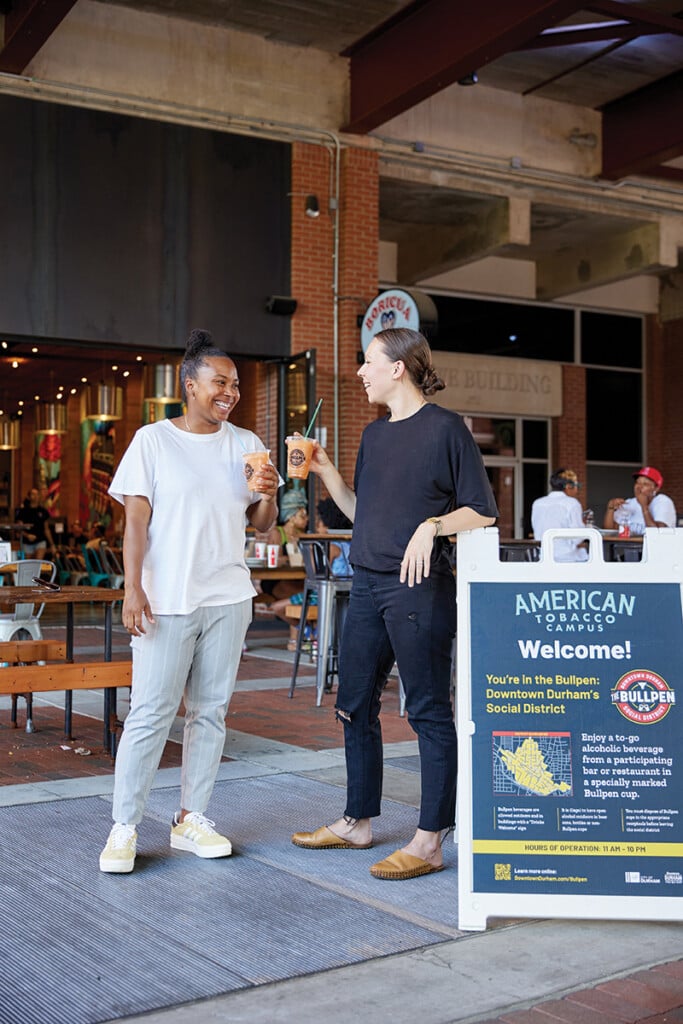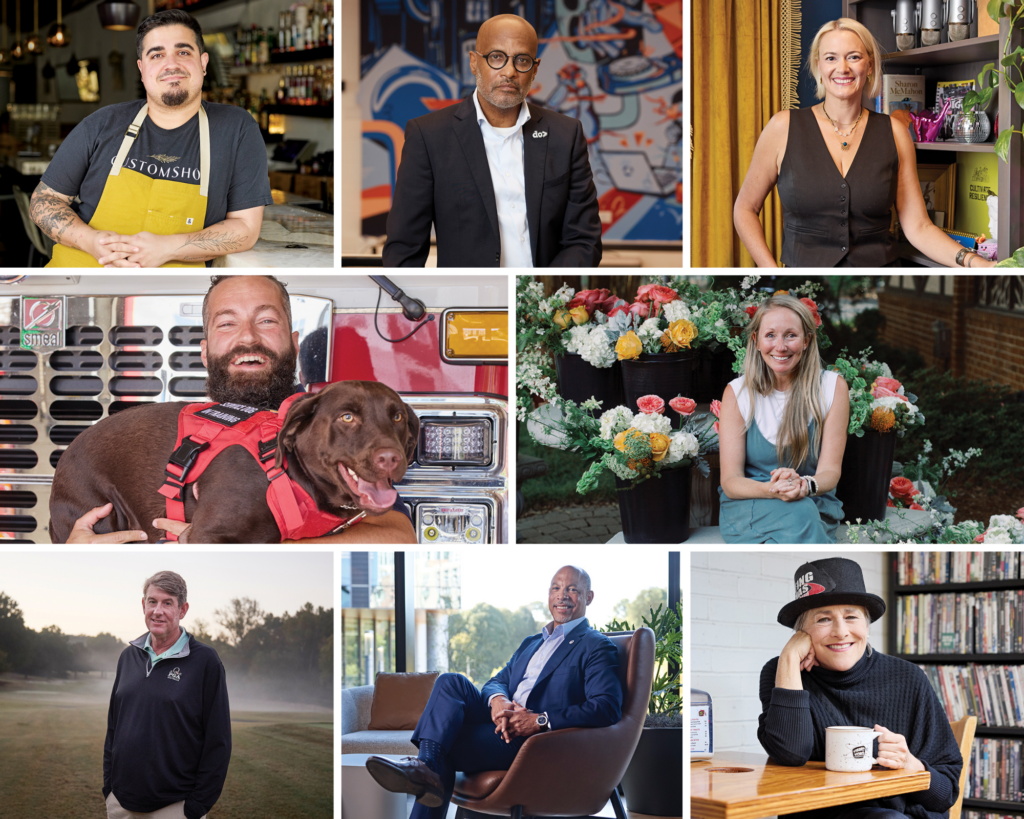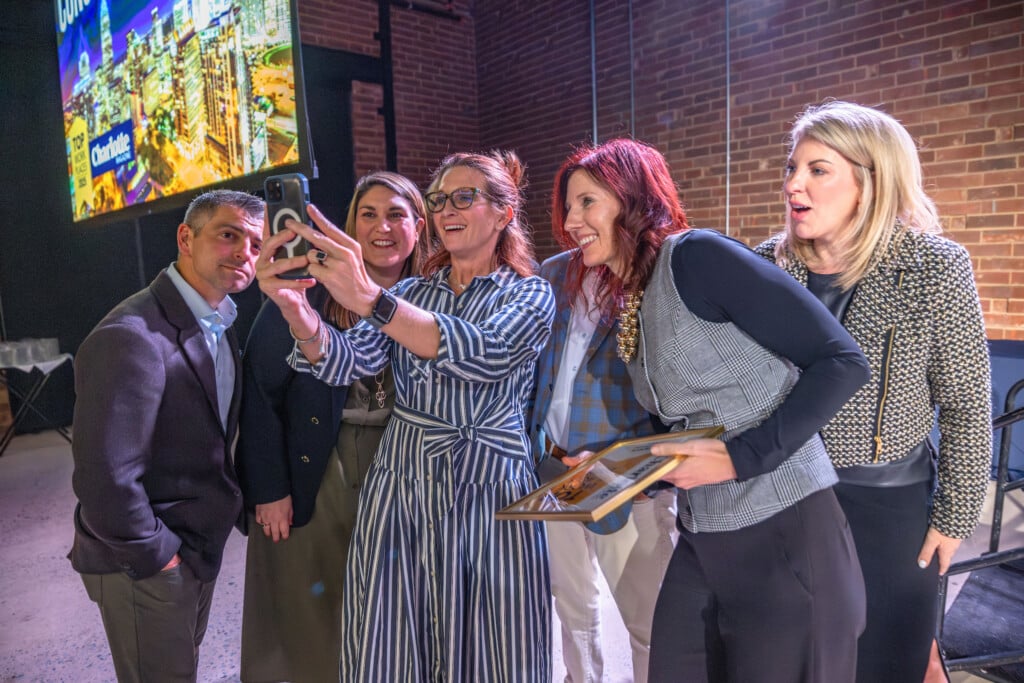Sip ‘n’ Stroll: Charlotte Finally Gets Social
The city finally joins Durham and 40 other North Carolina cities in establishing a social district

On a chilly October Wednesday, my fiancé and I plan to meet two other couples after work at The Glass Jug Beer Lab, a brewery a few minutes from our home in Durham. One arrives on time. The other is running late. By the time they arrive—it took time to convince their 3-year-old to at least wear socks with her sparkly jelly sandals—the rest of us are tapped out. Our drinks are drained, and a game of trivia we’d like to avoid is starting up.
But the toddler’s parents need a drink, so they order their beers to go. The bartender grabs two 16-ounce plastic cups from a stack by the register. On one side of each is the brewery’s logo, and on the other: “The Bullpen Downtown Durham Social District. Be 21. Drink Responsibly.” She scribbles the date and time on each cup with a Sharpie, then fills them with Silent Vice Helles.
The parents sip their beers as our group walks the half-mile—the 3-year-old rides piggyback—to a restaurant, Queeny’s, for chicken salad sandwiches, fried pickles, and a second round.
Both the Glass Jug and Queeny’s—and everything in between—operate within The Bullpen, Durham’s social district, which encompasses its 1-square-mile downtown. Between 11 a.m. and 10 p.m., folks on foot can carry alcoholic drinks downtown—as long as they’re in the logo-emblazoned cups and purchased from participating bars, restaurants, and other businesses with ABC permits.
More than 40 social districts have popped up across the state since September 2021, when the General Assembly legalized them to help urban businesses recover from COVID lockdowns. Cities and towns that want one or more social districts can establish them through ordinances, and municipalities large and small have, including Durham, Raleigh, Greensboro, Kannapolis, Huntersville, Hickory, and Madison.
Charlotte showed up to the party late, toward the end of 2023, when Plaza Midwood became the city’s first social district. While other districts are formally established by their city governments, Charlotte’s, adopted in August 2022, allows neighborhood organizations or entities to apply to create, fund, and manage districts themselves.
The City Council began to accept applications seven months after it passed its ordinance. The Plaza Midwood Merchants Association was the first applicant, and council members approved its district with a 9-2 vote on Oct. 23. The two who voted against it repeated a refrain often leveled at social districts: that they’ll lead to more drinking, crime, and garbage. But most Plaza Midwood business owners were excited about the approval, Jason Michel, executive director of the neighborhood business association, told me a week after the vote.
“We were waiting and advocating for (social districts) in Charlotte since the state passage,” he says. “Especially with communities like Plaza Midwood, where the character of it is still very pedestrian, and there’s such a variety of business sectors and options to explore—the idea of freedom of movement for folks who are maybe popping by a brewery but also want to pop by some retail shops or grab dinner is great.”
As of early November, the Merchants Association planned to soft-launch the social district in December and have it “fully up and running” by spring, with 20 to 30 businesses selling alcohol and another 70 to 100—retail stores, restaurants, salons, and more—welcoming drinks.
It took the Merchants Association more than a year of working “pretty heavily” on the planning and application before it was ready, Michel says. They had to present a full plan for management and maintenance; draft signs and recommend locations for them; gather proof of support from businesses and residents; and get signatures of support from at least 51% of property owners in and near Plaza Midwood.
Why did it take so long and so much effort? Michel thinks Charlotte’s legacy of traditional Southern values and unique history with alcohol—from NASCAR’s roots in bootlegging to the 1978 approval of liquor by the drink, which ended a statewide Prohibition-era ban on mixed drinks—might have contributed to the city’s hesitancy. “The city … had a little bit of a wait-and-see kind of mentality,” he says, “to see how social districts performed and whether the negative outcomes that people think social districts might have … would come to be.”

Bullpen bars and restaurants must serve to-go drinks in clear plastic cups with the business logo on one side and the social district’s on the other. Courtesy Glass Jug Beer Lab
As more social districts have opened in North Carolina, a blueprint has unfolded, one that most cities, Charlotte included, have followed. State law allows municipalities to open social districts as early as 7 a.m. and keep them running as late as 2 a.m. But most have opted to open their districts later and close them earlier to prevent any late-night ruckus. Plaza Midwood’s will run from 10 a.m. to 10 p.m.
Before the Merchants Association started the application process, its leaders visited other social districts across the state—like The Bullpen, launched in December 2022—and talked extensively with business owners. Michel says it only further sold them.
“We’ve been proponents of (the social district) since day one,” says Chris Creech, who owns The Glass Jug. “From a business sense, it made a ton of sense for us. … And there are no more drunk people walking around than there would be otherwise. Everyone is drinking the same amount, but instead of having to chug it before they leave to go somewhere else, they can slowly sip it while they walk to the next place.”
A few blocks over, Bull City Records doesn’t sell alcohol, but owner Chaz Martenstein allows drinks in his shop. “It’s all vinyl here, so I was worried at first about people coming in and spilling,” he says, “but it’s been a nonissue.”
Before Durham Food Hall director Ashley Malinowski moved to Durham in March, she lived and worked in Raleigh, which launched its social district in August 2022. “When it rolled out in Raleigh, people were a little hesitant about how crazy things were going to get,” she says. “But I’ve found that it actually creates almost a nicer environment for the city itself. It’s one of those things where it makes a bigger connection between the businesses in the city.”
As my friends and I walk around downtown Durham, I keep an eye out for the sloshed and rowdy. Granted, it’s a weekday, but I don’t see any—not even a single plastic cup on a sidewalk.
“It hasn’t been that crazy New Orleans scene that some people were worried about,” says Tiffany Bashore, director of business engagement for Downtown Durham, Inc., the economic development organization that manages The Bullpen. “All the feedback’s been really positive. I think businesses have seen a little uptick in sales. The biggest complaint we get is about the plastic cups.” (As a preventative measure, Plaza Midwood’s social district cups will be stainless steel and reusable.)
My friends’ daughter wants ice cream after we finish at Queeny’s, so we make the two-minute jaunt to The Parlour. A couple of us are still nursing our second drinks as my friend orders a scoop of cookies-and-cream for her kid. We cross Market Street to sit on benches in CCB Plaza, and the most energetic of our group jumps over patterns in the brick between bites of ice cream.
I finish my $5 Queeny’s Kolsch and walk 10 yards to toss the cup in a city trash can. A few other people sit around the square—some with drinks, some with ice cream, some just hanging out. Because of The Bullpen, we’re all able to hang out together—adults being adults, kids being kids—while we support downtown businesses. If Plaza Midwood’s social district looks like this, it won’t be Charlotte’s last.
TESS ALLEN is the associate editor.





